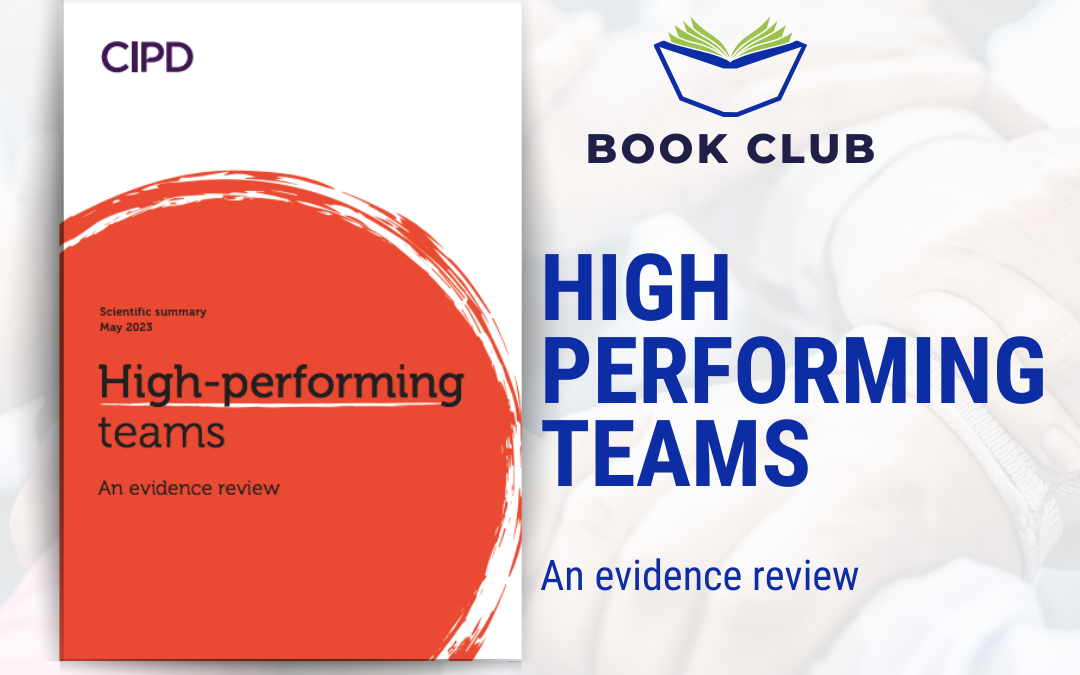Another amazing week and then this review arrived in my twitter feed courtesy of Rob Briner.
My former professional body #CIPD has taken an evidence-based approach to reviewing #highPerformingTeams. Using best available scientific research they have produced a stunningly valuable resource.
As a #teamCoach this is super helpful and if you manage teams in any form this is required reading.
The eagle-eyed amongst you will once again spot this isn’t a book review as such. BUT I thought it was such an important topic I wanted to share some key takeaways to whet your appetite.
What is a team?
You’ve seen many posts from me on this in the past and here’s a reminder straight from the research:
“A group of employees who:
- are formally established as a team
- have some autonomy to act as an interdependent group
- are dependent on each other within the the group”
And this in a nutshell encapsulates all of these points:
“A team is a collection of interdependent individuals who share responsibility for outcomes and fit into a larger social system”
Team Effectiveness
There are three types of effectiveness:
- task performance
- contextual performance
- adaptive performance
Top 2 Performance Influence Factors
- Psychological safety
- Shared thinking (cognitive consensus)
Diversity and Personality in Teams
Contrary to popular belief diversity is not a key influencer of performance and the drivers for diversity will be more around ethical considerations – which is an interesting topic for research in itself. My thoughts are around the whole subject of ‘culture’ in organisations. And again ‘culture’ could also be a separate piece of evidence-based research!
I also came across the lack of evidence diversity plays in team performance whilst researching my book on coaching self-organising teams. I noted in my research that context is also a consideration.
Personality traits (NOT type*) were also considered i.e. the Big Five:
- Openness to experience
- Conscientiousness
- Extroversion v Introversion
- Agreeableness
- Neuroticism
Of these only agreeableness and conscientiousness lead to better performance.
My take on this is it makes sense when you look at team effectiveness mentioned above and links in with complex adaptive systems thinking. (Although this didn’t form part of the research.)
And for those of you who read my post on conditions for successful teams please not that “getting talented people in the right roles if crucial.”
Trust and Psychological Safety
This quote does all the hard lifting on this topic:
“Psychological safety focuses on the actions we are willing to take ourselves, whereas trust focuses on the actions we believe others will take.”
There was a key finding on the increased importance of trust and cohesion for virtual teams to performance.
Learning
Fascinatingly how teams learn as a group has “virtually little impact on performance”. I am going to look at the associated research on this to understand this in more depth.
The article suggests that learning that focuses on reflection around goals, collaboration and communication is important.
This is suggestive that contextual learning is the key.
Team Dynamics
This is a personal favourite topic and area of interest for me and the evidence suggests that it is vital for team performance.
Specifically
- Trust
- Psychological safety
- Team cohesion
There you have it – a very quick skip through all the gems within this article. You can download both the summary article and the related scientific research.
I will using this to shape my work with teams and incorporating the learning into my programmes.
An evidence-based practice is one based on current evidence and a willingness to update your thinking as new evidence comes to light.
I am thrilled the @#CIPD is working closely with Rob Briner to make the people side of business more robust.
I may even rejoin the #CIPD!
Let me know how this either triggered you or made you think about teams in a different way
*for a robust discussion on Type see any posts from Rob Briner , Paul Gibbons, and Tricia Kennedy.
https://www.cipd.org/en/knowledge/evidence-reviews/high-performing-teams


Recent Comments